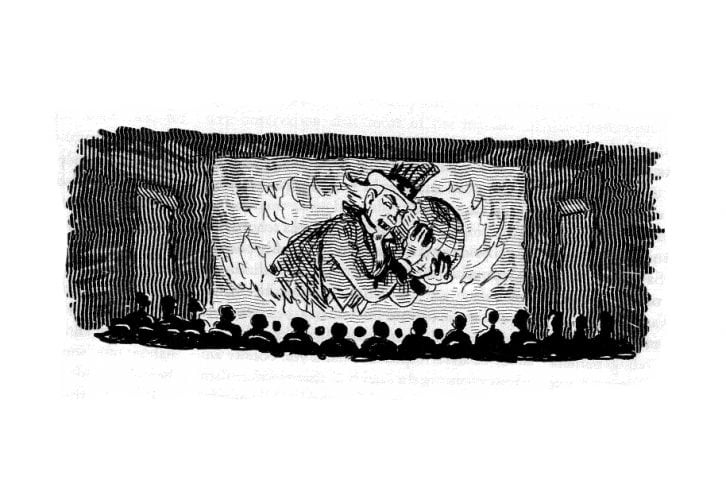The parade began with placards announcing the countries that had been conquered, wagons bearing the spoils of war, and trophies commemorating the campaign's victories. Then came the captive kings, queens, and their children, along with other eminent prisoners, destined usually for execution but sentenced first to walk through the crowds of taunting citizens lining the route. The procession's highlight was the victorious general, clad in a purple toga adorned with golden stars, who rode in a four-horse chariot. Behind him marched the triumphant army and the sacrificial animals. Beside him stood a slave, holding a laurel wreath over the general's head and whispering, "Remember that you too are mortal."
When the Romans celebrated a Triumph, they did it in style. General Tommy Franks won't even get a tickertape parade. And don't expect to see Saddam's wives or Tariq Aziz being led in chains down Pennsylvania Avenue anytime soon. America is, thank God, a very different kind of republic.
The Roman attitude towards the nations they conquered could be summed up in Cicero's candid remark, "Let them hate us, so long as they fear us." Americans, by contrast, like to be liked. Ours is perhaps the only great power in history that wants, and expects eventually to receive, the gratitude and admiration of its conquered enemies. We are especially happy if our former enemies rehabilitate themselves along the lines of our own regime and culture. There is humanity and even a certain high-mindedness in this, to be sure; but there is also danger.
In the case of Iraq, prudence counsels that Saddam's tyranny be replaced with the best practicable regime, not the best conceivable. In short, it isn't necessary to install a perfect democracy in Iraq in order to justify the "regime change" that the U.S. enforced. It is sufficient to help establish a form of government better than the one they had; a non-tyrannical regime that will have a fighting chance of securing individual rights and the common good.
Unfortunately, the Bush Administration's rhetoric, and perhaps its thinking, is a little loose on this subject. The president seems sometimes to regard liberty and democracy as synonyms, which they are not. Across the Islamic world, democracy seems to be confused with a species of majoritarian tyranny. The refrain is: Throw out the local despots and let the people rule, even if, perhaps especially if, they lust after an "Islamic republic" so severe that it would make republican Rome look softhearted. Once in power, the mullahs will solve the problem of majority tyranny—by so arranging things that no future majority can ever vote them out.
But democracy doesn't mean "one man, one vote, once." This elementary point underlies the genius of American republicanism, which strives to keep majority rule consistent with individual liberty. It hasn't been easy. It takes a certain character in the citizens in addition to the virtue-saving devices of the Constitution. Whether the Iraqis will develop such a liberal democracy is doubtful. But Americans can at least offer them the lessons of our own hard-won experience, and do them the favor of not offering full-blown democracy as an immediate export.
Bush recently challenged those who "believe democracy in the Middle East is unlikely, if not impossible," to consider its remarkable successes in Germany, Japan, Eastern Europe, and Russia. Fair enough, but the democratization of Germany and Japan had as its precondition their total defeat in a more-or-less total war, followed by a lengthy (still ongoing, in some respects) occupation by the victorious powers. Their rehabilitation occurred in the context of another great struggle, the Cold War, which forced them to choose sides, cementing their democratic loyalties. Neither condition obtained in post-Cold War Eastern Europe and Russia, with the result that both, especially the latter, are shakily democratic at best.
Turkey might be a better example. Launched after World War I on an aggressive, top-down program of liberalization, Turkey remains a work-in-progress. Though a better democracy than it used to be, its voters are still superintended by the military in order to ensure their conformity with liberal principles. The Turks took nearly four-score-and-seven years to get this far; the Iraqis may need that and more.
Which is not to say that the reforms shouldn't begin as soon as possible. But when Bush promised to work with the new leaders of Iraq "as they establish a government of, by, and for the Iraqi people," he wrote a democratic check that will prove very hard to cash. In America's case, fulfilling such a promise required a great Civil War, not to mention Reconstruction. Chances are that many Iraqis would prefer to remain unreconstructed.


